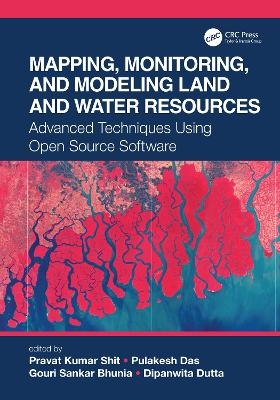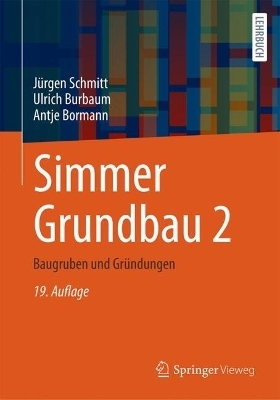
Mapping, Monitoring, and Modeling Land and Water Resources
CRC Press (Verlag)
978-0-367-48683-9 (ISBN)
The wide range of challenges in studying Earth system dynamics due to uncertainties in climate change and complex interference from human activities is creating difficulties in managing land and water resources and ensuring their sustainable use. Mapping, Monitoring, and Modeling Land and Water Resources brings together real-world case studies accurately surveyed and assessed through spatial modeling. The book focuses on the effectiveness of combining remote sensing, geographic information systems, and R. The use of open source software for different spatial modeling cases in various fields, along with the use of remote sensing and geographic information systems, will aid researchers, students, and practitioners to understand better the phenomena and the predictions by future analyses for problem-solving and decision-making.
Dr. Pravat Kumar Shit is an Assistant Professor at the P.G. Department of Geography, Raja N. L. Khan Women’s College (Autonomous), West Bengal, India. He received his M.Sc & Ph.D. degrees in Geography from Vidyasagar University and PG Diploma in Remote Sensing & GIS from Sambalpur University. His research interests include applied geomorphology, soil erosion, groundwater, forest resources, wetland ecosystem, environmental contaminants & pollution, and natural resources mapping & modelling. He has published nine books (seven books in Springer) and more than 60 papers in peer-reviewed journals. He is currently the editor of the GIScience and Geo-environmental Modelling (GGM) Book Series, Springer-Nature. Dr. Pulakesh Das is currently work in World Resources Institute India (WRII), New Delhi India. Previously, he was teaching as an Assistant Professor in the Department of Remote Sensing & GIS, Vidyasagar University, Midnapore, West Bengal, India. He has received his Ph.D. degree from the Indian Institute of Technology (IIT) Kharagpur, India in July 2019. He completed his M.Sc (2012) in Remote Sensing & GIS and B.Sc (2010) in Physics from the Vidyasagar University, Midnapore, West Bengal, India. His primary research area includes Land Use Forest Cover (LUFC) modeling, Hydrological Modeling, Forest Cover Dynamics and Climate Change, Digital Image Processing, Microwave Remote Sensing for Soil Moisture and Forest Biomass Estimation, Plant Biophysical Characterization, etc. He has published more than 13 research articles in reputed peer-reviewed journals. Dr Gouri Sankar Bhunia received Ph.D. from the University of Calcutta, India in 2015. His Ph.D. dissertation work focused on environmental control measures of infectious disease using geospatial technology. His research interests include environmental modelling, risk assessment, natural resources mapping and modelling, data mining and information retrieval using Geospatial technology. Dr Bhunia is associate editor and on the editorial boards of three international journal in health GIS and Geosciences. Dr. Bhunia has published more than 60 articles in various scopus indexed journals. Dr. Dipanwita Dutta has been working as Assistant Professor in the Department of Remote Sensing and GIS, Vidyasagar University since October 2012. She completed her M. Sc. in Geography from the University of Calcutta in 2006 and obtained her second M. Sc. degree in Remote Sensing and GIS under a joint collaboration program of International Institute for Geo-information science and Earth Observation (ITC), University of Twente (The Netherlands) and Indian Institute of Remote Sensing, Dehradun (India) in the year 2010. She started her career as senior research fellow at the Indian Agricultural Research Institute, Pusa, New Delhi. She received her Ph. D. degree from Jamia Millia Islamia, New Delhi in collaboration with Indian Institute of Technology (IIT) Kharagpur, India in 2016. Her broad area of research includes agricultural drought, dryland issues, crop monitoring, land use dynamics, urban green space and her research projects have been funded by UGC, DST-SERB (Govt. of India). Dr. Dutta has published more than 31 articles, book chapters in reputed international journals and edited book volumes. She is reviewer of many national and international journals. Dr. Dutta has been awarded NUFFIC fellowship for three months staying at ITC, Netherlands as part of her M. Sc. course. She has been awarded International Travel Grant from Department of Science and Technology, Govt. of India for visiting the University of Salzburg, Austria. She has also been awarded WMO-ICTP fellowship for attending an international workshop at ICTP, Italy.
Chapter 1 Introduction to Part I: Mapping, Monitoring, and Modeling of Land Resources
Chapter 2 Spatio-Temporal Investigation of Mining Activity and Its Effect on Landscape Dynamics: A Geo-Spatial Study of Beejoliya Tehsil, Rajasthan (India)
Chapter 3 Mapping Areas for Growing Pulses in Rice Fallows Using Multi-Criteria Spatial Decisions
Chapter 4 Assessing Desertification Using Long-Term MODIS and Rainfall Data in Himachal Pradesh (India)
Chapter 5 Land Use/Land Cover Characteristics of Odisha Coastal Zone: A Retrospective Analysis during the Period between 1990 and 2017
Chapter 6 Evaluating Landscape Dynamics in Jamunia Watershed, Jharkhand (India) Using Earth Observation Datasets
Chapter 7 Drought Frequency and Soil Erosion Problems in Puruliya District of West Bengal, India: A Geo-Environmental Study
Chapter 8 Effects of Cyclone Fani on the Urban Landscape Characteristics of Puri Town, India: A Geospatial Study Using Free and Open Source Software
Chapter 9 Land Resource Mapping and Monitoring: Advances of Open Source Geospatial Data and Techniques
Chapter 10 Introduction to Part II: Mapping, Monitoring, and Modeling of Water Resources
Chapter 11 Improving Wetland Mapping Techniques Using the Integration of Image Fusion Techniques and Artificial Neural Network (ANN)
Chapter 12 Open Source Geospatial Technologies for Generation of Water Resource Development Plan
Chapter 13 Geo-Spatial Enabled Water Resource Development Plan for Decentralized Planning in India: Myths and Facts
Chapter 14 Automatic Extraction of Surface Waterbodies of Bilaspur District, Chhattisgarh (India)
Chapter 15 Valuing Ecosystem Services for the Protection of Coastal Wetlands Using Benefit Transfer Approach: Evidence from Bangladesh
Chapter 16 Identification of Groundwater Prospect of Bilaspur District: A Multi-Criteria Decision Making Approach
Chapter 17 Long-Term Drought Assessment and Prediction Driven by CORDEX-RCM: A Study on a Hydro-Meteorologically Significant Watershed of West Bengal
Chapter 18 Use of Open Source Software to Assess Spatio-Temporal Variation of Agricultural Drought at Regional Scale
Chapter 19 Snow Cover Monitoring Using Topographical Parameters for Beas River Catchment Area
Chapter 20 Land Surface Water Resource Monitoring and Climate Change
Index
| Erscheinungsdatum | 29.06.2021 |
|---|---|
| Zusatzinfo | 78 Tables, black and white; 80 Line drawings, black and white; 77 Halftones, black and white; 157 Illustrations, black and white |
| Verlagsort | London |
| Sprache | englisch |
| Maße | 178 x 254 mm |
| Gewicht | 889 g |
| Themenwelt | Naturwissenschaften ► Geowissenschaften ► Geologie |
| Naturwissenschaften ► Geowissenschaften ► Hydrologie / Ozeanografie | |
| Technik ► Umwelttechnik / Biotechnologie | |
| Weitere Fachgebiete ► Land- / Forstwirtschaft / Fischerei | |
| ISBN-10 | 0-367-48683-0 / 0367486830 |
| ISBN-13 | 978-0-367-48683-9 / 9780367486839 |
| Zustand | Neuware |
| Informationen gemäß Produktsicherheitsverordnung (GPSR) | |
| Haben Sie eine Frage zum Produkt? |
aus dem Bereich


